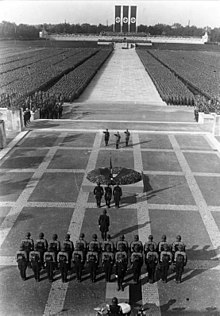Economy and culture
Hitler oversaw one of the greatest expansions of industrial production and civil improvement Germany had ever seen, mostly based on debt flotation (refinancing long term debts into cheaper short term debt) and expansion of the military. Nazi policies toward women strongly encouraged them to stay at home to bear children and keep house. In a September 1934 speech to the National Socialist Women's Organization, Adolf Hitler argued that for the German woman her "world is her husband, her family, her children, and her home." This policy was reinforced by bestowing the Cross of Honor of the German Mother on women bearing four or more babies. The unemployment rate was cut substantially, mostly through arms production and sending women home so that men could take their jobs. Given this, claims that the German economy achieved near full employment are at least partly artefacts of propaganda from the era. Much of the financing for Hitler's reconstruction and rearmament came from currency manipulation by Hjalmar Schacht, including the clouded credits through the Mefo bills.Hitler oversaw one of the largest infrastructure-improvement campaigns in German history, with the construction of dozens of dams, autobahns, railroads, and other civil works. This revitalising of industry and infrastructure came at the expense of the overall standard of living, at least for those not affected by the chronic unemployment of the later Weimar Republic, since wages were slightly reduced in pre-World War II years, despite a 25% increase in the cost of living.[86] Laborers and farmers, the traditional voters of the NSDAP, however, saw an increase in their standard of living.
Hitler's government sponsored architecture on an immense scale, with Albert Speer becoming famous as the first architect of the Reich. While important as an architect in implementing Hitler's classicist reinterpretation of German culture, Speer proved much more effective as armaments minister during the last years of World War II. In 1936, Berlin hosted the summer Olympic games, which were opened by Hitler and choreographed to demonstrate Aryan superiority over all other races, achieving mixed results.
Although Hitler made plans for a Breitspurbahn ("broad gauge railroad network"), they were preempted by World War II. Had the railroad been built, its gauge would have been three metres, even wider than the old Great Western Railway of Britain.
Hitler contributed slightly to the design of the car that later became the Volkswagen Beetle and charged Ferdinand Porsche with its design and construction.[87] Production was deferred because of the war.
On 20 April 1939, a lavish celebration was held in honour of Hitler's 50th birthday, featuring military parades, visits from foreign dignitaries, thousands of flaming torches and Nazi banners.[88]
An important historical debate about Hitler's economic policies concerns the "modernization" issue. Historians such as David Schoenbaum and Henry Ashby Turner have argued that social and economic polices under Hitler were modernization carried out in pursuit of anti-modern goals.[89] Other groups of historians centred around Rainer Zitelmann have contended that Hitler had a deliberate strategy of pursuing a revolutionary modernization of German society.[90]
In his first four years of government the number of unemployed dropped from 6 million to 900 thousand people, the gross national product grew 102%, he doubled the per capita income, augmented companies' profits from 175 million to 5 billion reichsmarks and reduced hyperinflation to a maximum of 25% a year.

0 comments:
Post a Comment